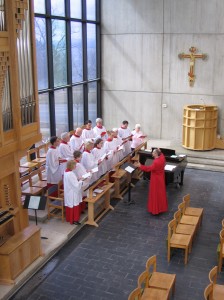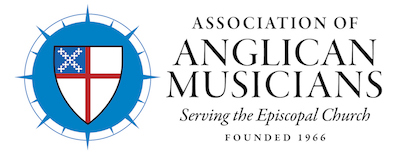The Association of Anglican Musicians
Founded in 1966, the Association of Anglican Musicians is a member-led nonprofit of musicians and clergy serving in the Episcopal Church and internationally within the Anglican Communion.

Our Mission
Recognizing that the music of the church finds its primary expression within the framework of the liturgy, this Association takes as its purpose the elevation, stimulation, and support of music and the allied arts in all their aspects in the Episcopal Church and the larger Anglican tradition, and especially in their relationship to liturgy.
The History of AAM
The timeline at the link below draws heavily upon Victor Hill’s, A Concise History of the Association of Anglican Musicians: 1966-2016, which, in part, was based on previous work by Mildred Buttrey and Edgar Billups.
View Past Presidents of AAM
View the Interactive Timeline
(Click to zoom in on the text in the timeline.)
Code of Ethics of the Association of Anglican Musicians
This revision was ratified by the membership on June 22, 2022.
Recognizing the love into which we have been sealed at baptism, and our continuing struggle to show that love in every aspect of our lives, the several members of the Association of Anglican Musicians enter into covenant with each other and to themselves to uphold and abide by certain professional and personal tenets as members of the Association in good standing:
- In the conduct of their personal and professional lives, members will strive for love, justice and peace in all their relationships and work, affirming the transforming power of the Gospel in their lives, respecting the dignity of all persons with whom members work or come into contact, and living as best as members are able into the Baptismal Covenant.
- While members may seek employment where and how they choose, seeking employment in a position that is not currently open and/or is currently occupied by another person presents troublesome moral issues and could also incur legal liability. If a position is held by another under an employment contract, interference in that employment relationship could be actionable as a wrongful interference with contractual relations. Members should take to heart the Golden Rule and also remember that, just because an action is legally permissible, such action is not necessarily moral or ethical.
- Members asked to perform any musical or liturgical duty within the premises of another’s professional responsibility should seek the consent and counsel of the chief liturgical officer or other employment officer and, in the case of musical events, of the incumbent musician of that institution. In cases where a third party has requested that professional services for weddings, funerals, teaching, or the like be performed by a person who is not employed by the institution, the appropriate incumbent employee should receive, and can reasonably expect to receive, compensation for (1) time incurred in determining the qualifications of the person in question, (2) time incurred in reviewing proposed music or other material to be used, (3) scheduling the person in question into the facility for practice or other preparation, and (4) acquainting the person in question with the facility, instruments, etc. Whether such compensation is provided by the institution or the third party is a matter to be determined jointly by the institution and members. This provision does not apply, however, to the use of the institution for contracted events by professional organizations sponsoring recitals, concerts, lectures, and the like.
- The consistent goal of each member shall be to promote and strengthen working relationships among all persons served by or supervising the member in the employing institution. Members shall comply with the governing canons, discipline, constitutions or other codified regulations of the institution served. Members shall comply with all applicable statutes and regulations of the jurisdiction in which the institution is located and/or in which work is performed by the member. Members should honor all appropriate channels of authority for making decisions and/or expressing differences of opinion within the institution. Violation of the provisions of this section may result in the termination of the violator’s membership.
- Members shall insist upon compliance with copyright laws within all areas of their responsibility.
Association of Anglican Musicians is a Michigan corporation, qualified as a 501(c)(3) charitable organization under the IRS Code.
